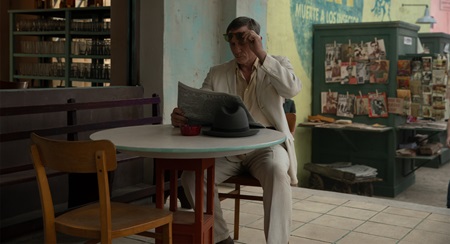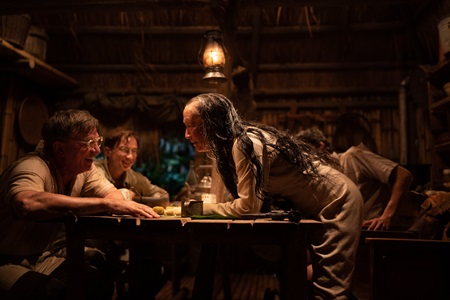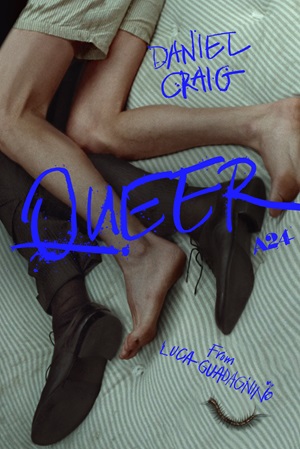
Rambunctious Queer is an Ejaculatory Descent into the Humanistic Unknown
The last time I tackled William S. Burroughs was when David Cronenberg’s phantasmagorical oddity Naked Lunch played Spokane’s Magic Lantern Theater in 1991. I hoped that reading the source material would add context and give additional insight into the wickedly weird motion picture I’d recently sat through. I was wrong.
However, I did pick up Junkie at the same time. Even though I haven’t returned to it in over 30 years, I must have read that paperback four or five times. That book is a masterpiece.
Be that as it may, I have not read Burroughs’ unfinished, semiautobiographical Queer, published in 1985 but written between 1951 and 1953. After watching Challengers and Call Me by Your Name impresario Luca Guadagnino’s disquietingly rambunctious adaptation, I feel compelled to read what Burroughs had to say about his doppelgänger William Lee’s hedonistic adventures in Mexico City. Granted, I’d probably get similar clarity same as my reading of Naked Lunch back in high school.
Part of me thinks this is exactly as it should be. Burroughs was an indecipherable paradox. There is lucid lunacy to his crackpot musings, much of them dealing with gender, sexuality, and the unfathomable conundrum that is the human condition.
For Queer, Guadagnino reteams with his Challengers screenwriter Justin Kuritzkes, and again the pair show no interest in playing it safe. Their adaptation is a stream-of-consciousness explosion of sex, longing, adoration, substance abuse, and grief that leaps from one emotional permutation to the next, with zero thought as to whether the audience can keep up. They mix genres, visual styles, and melodramatic histrionics with carnally promiscuous ambition, then set it all to a killer score composed by Trent Reznor and Atticus Ross (The Social Network), augmented by songs that run the gamut from Nirvana, Prince, Sinéad O’Connor, and New Order to big band tunes of the era.
As for the plot? It’s 1950, and American expat William Lee (Daniel Craig) is shambling through Mexico City streets in an alcohol- and drug-induced haze as he thirsts after many of the young men who cross his path. He’s particularly drawn to Eugene Allerton (Drew Starkey), a former soldier who crossed the southern border for reasons entirely his own. The pair strike up a friendship that quickly becomes intimate. Eventually, they travel to South America in search of a fabled plant that might grant them deeper psychedelic insight into the world and the peoples who inhabit it.
There’s little rhyme or reason to any of this. It’s all a foggy metaphorical blur of naked bodies, whirling cigarette smoke, and tequila shots with a lukewarm beer chaser. Are Lee and Allerton in love? It’s hard to say, and Guadagnino and Kuritzkes refuse to allow any hints of emotional certainty. But there is lust and longing. There is a need that is not only sexual but intellectual in nature. While Lee clearly needs Allerton more than the latter does him, their mutual affection still comes across as genuine, and maybe that’s all that truly matters.
A wild group of supporting characters rushes in and out of the story, almost all of whom make an impression. Chief among them are the virtually unrecognizable, scene-stealing veteran character actors Jason Schwartzman and Oscar nominee Lesley Manville. I’m not going to spoil who they play or what they have to do with the affair. Just know that each is outstanding, delivering two of my favorite supporting performances of 2024.
Craig is magnificent. Much will likely be made of his “bravery” in allowing himself to be seen in the buff while engaging in erotic scenes with Starkey, but I am far more impressed by his emotional nakedness. His Lee is a wild eccentric desperately trying to hold himself together, even though he’s constantly on the cusp of a psychological breakdown. Craig’s jittery, almost cartoonish vocal bombast is juxtaposed nicely with his sweaty terror at the thought that Lee may have to walk through the remainder of his days alone. I couldn’t take my eyes off of him.
Does it all work? I honestly can’t say. It took me multiple viewings to come around to not just liking Cronenberg’s Naked Lunch but also realizing that it’s a bona fide cinematic masterwork. While I have no clue if my feelings about Guadagnino’s adaptation of Queer will follow a similar trajectory, I believe this type of revelatory evolution could take place, as this film does speak volumes. The director crafted an ejaculatory descent into the unfinished humanistic unknown that’s probably unlike anything I’ve ever seen. I have a feeling Burroughs, if he were still around to see the finished film, wouldn’t have wanted it any other way.
– Review reprinted courtesy of the SGN in Seattle
Film Rating: 3 (out of 4)








